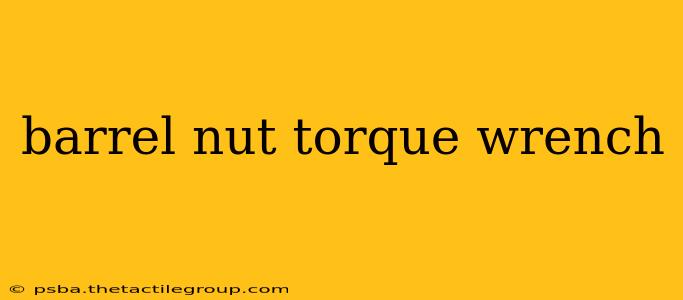Building or maintaining an AR-15 rifle requires precision, and no step is more crucial than properly torquing the barrel nut. Using the wrong torque can lead to a host of problems, from accuracy issues and malfunctions to catastrophic failures. That's why a dedicated barrel nut torque wrench is an indispensable tool for any serious AR-15 owner or builder. This guide will delve into the importance of proper torque, the types of wrenches available, and what to consider when making your purchase.
Why Precise Torque is Crucial for Your AR-15
The barrel nut is the foundation of your AR-15's upper receiver, securing the barrel and ensuring proper alignment. Under-torquing the nut can lead to:
- Loose barrel: This results in poor accuracy, as the barrel shifts and loses its zero. You'll experience inconsistent shot placement, rendering your firearm unreliable.
- Receding barrel nut: In extreme cases, the barrel nut can loosen significantly during firing, potentially damaging the receiver or even causing the barrel to detach.
Conversely, over-torquing the barrel nut can cause:
- Damaged threads: Stripped threads on the barrel extension or receiver are expensive to repair, potentially requiring replacement parts.
- Receiver cracking: Excessive torque can put immense stress on the receiver, leading to cracks or even complete failure.
Therefore, achieving the correct torque specification is paramount to the safety and reliability of your firearm. This is where a dedicated barrel nut torque wrench becomes invaluable.
Types of Barrel Nut Torque Wrenches
Several types of torque wrenches are suitable for this task:
1. Beam-Type Torque Wrenches
These are generally more affordable but less precise than other types. They use a simple beam and pointer to indicate when the set torque is reached. While functional for occasional use, they may not offer the same level of accuracy as more advanced options.
2. Click-Type Torque Wrenches
Click-type wrenches are more common and offer greater precision. They provide an audible "click" when the set torque is reached, indicating you've achieved the proper tightness. These are a good balance of cost and accuracy.
3. Digital Torque Wrenches
Digital torque wrenches provide the highest level of accuracy and precision. They display the applied torque digitally, allowing for extremely fine control. While more expensive, the increased accuracy is beneficial for critical applications.
Choosing the Right Barrel Nut Torque Wrench
When selecting your barrel nut torque wrench, consider these factors:
- Torque range: Ensure the wrench's range covers the manufacturer's specified torque for your barrel nut. Common ranges are between 30-70 in-lbs.
- Accuracy: The accuracy of the wrench is crucial. Choose a wrench with a high degree of accuracy for optimal results.
- Type: Select the type of wrench that best suits your needs and budget. Click-type wrenches generally strike a good balance.
- Calibration: Regular calibration is essential to maintain accuracy. Consider the cost and availability of calibration services.
Beyond the Wrench: Essential Considerations
Even with the best torque wrench, several additional steps contribute to a successful barrel nut installation:
- Proper lubrication: Use a high-quality gun grease on the barrel extension threads.
- Cleanliness: Ensure both the barrel extension and receiver threads are clean and free of debris.
- Consistent pressure: Apply even, steady pressure to the wrench to avoid inaccurate readings.
Conclusion: Investing in Accuracy
A quality barrel nut torque wrench is a critical investment for any responsible AR-15 builder or owner. It ensures the safety and reliability of your firearm by preventing damage from under- or over-torquing. By carefully selecting the right wrench and following proper installation procedures, you can maintain the accuracy and longevity of your AR-15. Remember that precision is key when it comes to firearm assembly and maintenance.

